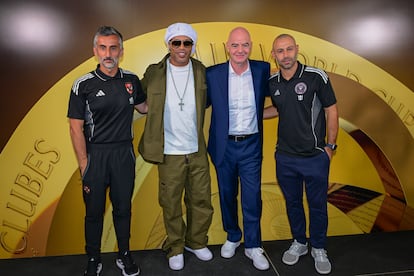José Riveiro's unthinkable trip to Finland, South Africa, and Cairo before challenging Leo Messi: "I shouldn't be here."

The Club World Cup is reached by many means, including the country roads traveled by Vigo-born coach José Riveiro. He was in Celta's youth academy and in 2014 moved to the Finnish League as an assistant, where he became head coach four years later. In 2022, he was signed by a South African team (Orlando Pirates) located in one of the areas most devastated by Apartheid (Soweto). A few weeks ago, he was signed by Egyptian giants Al Ahly, and this Sunday he will open the FIFA World Cup against Leo Messi's Inter Miami (2:00 a.m., Spanish time, DAZN).
“I shouldn't be sitting here; this doesn't usually happen,” he says via video call from his office. “I started in the Third Regional. I've never had an agent or anyone to offer me to other clubs, but it may have been luck or I've made the right decisions. People have been noticing my work. I don't follow any plans. When I finish here, maybe I won't coach anymore, who knows. I'm 47 years old, I don't know how much health I have left. I'm not being dramatic, okay? Football involves a lot of sacrifices if you take it seriously. I've been away from home for 11 years without stopping. And if I still feel like coaching, I will,” explains this globetrotter who, despite traveling halfway around the world, still retains a fairly pronounced Galician accent.
As almost always in these kinds of situations, it all starts with someone knowing someone and a protagonist taking the plunge. “I was friends with Pablo Couñago, a former Celta player, who was in Finland. There, he met a former teammate from Ipswich, England, who was just starting out in coaching, and asked him for help finding a Spanish assistant. I had signed my first contract with Celta, with the U-18 team, but I had always wanted to leave, and the level of that league suited me,” he explains. And he went, despite not speaking English, much less Finnish.
My wife and I miss the Finnish lifestyle. People think it's very cold, and it's true, although the problem is the lack of light. But they give you patience when it comes to training.
His first destination, Honka, went bankrupt after being saved almost on the final day. He only stayed for four months. From there, he went to PK-35 in the Second Division, with whom he won promotion; however, in the First Division, things went sour with the club and the coach, and he left. His third destination was HJK Helsinki, where he did stay for two and a half years, which led him to become head coach, now at FC Inter. “My wife and I miss the Finnish lifestyle, its social and private nature. People always think it's very cold, and it's true, although the problem is the lack of light, which can affect you. But when it comes to coaching, they give you patience and respect,” José Riveiro says in a calm voice. “I'm a very thoughtful person,” he points out.

And from there, to South Africa, 15,000 kilometers away. “Day and night, everything. You go from a super-disciplined footballer to a very talented one, but with far fewer habits than an athlete should have, although eager to learn. We won five titles and reached the semifinals of the African Champions League. I had players who are my children. I don't think I'll ever repeat what I experienced emotionally,” he emphasizes.
Nor, perhaps, what he saw in Soweto, a Johannesburg neighborhood home to his former team, Orlando Pirates, and the scene of one of the worst episodes of Apartheid in 1976, which left around 700 dead when a protest by black students was violently suppressed. Riveiro explains that the two biggest South African teams, Pirates and Kaizer Chiefs, are from there. “The rivalry is strong, but not violent. It's like having a laugh. That derby is inexplicable. I took my friends there, and they couldn't believe it,” he recalls.
I've had conversations with politicians and police chiefs [in the Soweto neighborhood of Johannesburg], and they tell you that when the team wins, there is much less crime and domestic violence.
He didn't live there for security reasons, but he did tour the neighborhood, which is estimated to be home to some seven million people. "In the houses, which are actually shacks, there's always a television antenna. In every one. And it's for football. There's no one who isn't a fan. For most people, Pirates is the only thing going well in their lives. I've had conversations with politicians and police chiefs, and they tell you that when they win, there's much less crime and domestic violence. These three years that the team has been doing well have helped make part of the country happy. Here at Al Ahly, something similar happens. For people who don't have all the opportunities they should, what a club represents goes much further [winner of four of the last six African Champions Leagues]. It's a beautiful thing for us. I don't call it pressure. What I like is the game, its complexity, its logic, studying it. As a footballer, I was very bad and didn't want to give it up," says the Galician coach.
This Tuesday, José Riveiro, who will also face Porto and Palmeiras, attended a World Cup presentation event alongside FIFA President Gianni Infantino , Ronaldinho, Inter Miami coach Javier Mascherano, and music producer Emilio Estefan. “For a coach of my profile, coming from where I do, it's a special situation,” he admits. “The other day I did an interview on Egyptian television with 25 million viewers. My life here is going to be impossible. Outside, I remain anonymous. When I arrive at Barajas, nobody knows me,” he concludes.
EL PAÍS



%3Aformat(jpg)%3Aquality(99)%3Awatermark(f.elconfidencial.com%2Ffile%2Fbae%2Feea%2Ffde%2Fbaeeeafde1b3229287b0c008f7602058.png%2C0%2C275%2C1)%2Ff.elconfidencial.com%2Foriginal%2F45a%2F460%2F672%2F45a4606724f927041dbbdb0d3aef6597.jpg&w=3840&q=100)

